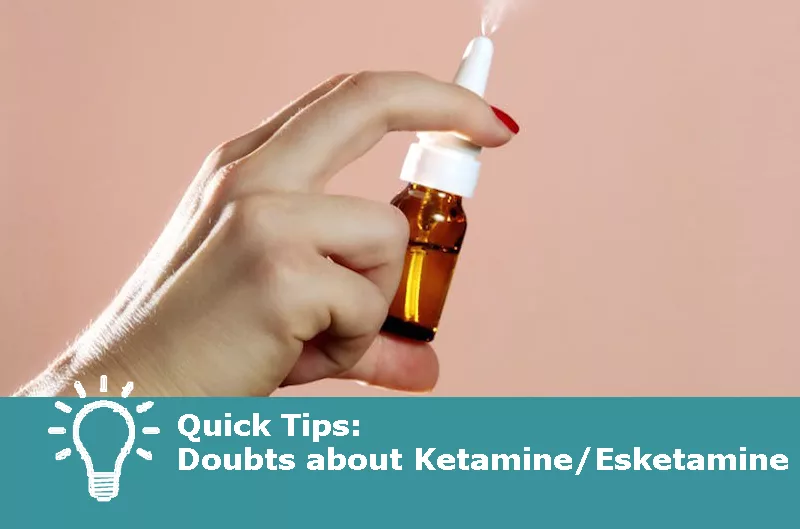Ketamine and esketamine have been shown to provide rapid relief of suicidality, however, many lingering doubts have been raised about these medicines. In a previous article from The Carlat Psychiatry Report, Nolan Williams, M.D., discusses the potential negative consequences of ketamine/esketamine treatment. Here are some of Dr. Williams’s tips:
It might have an abuse liability. “There have been cases where patients get exposed to ketamine in an office setting and then start to order it off the internet” (Study Link). “However, ketamine has some promising data as a treatment for addictions, like cocaine and alcohol (Study Link)”.
Discontinuation may increase suicidality. There were 6 deaths in FDA-registration studies, but it was not statistically significant, therefore, the drug was ultimately approved. “Three of them were definite suicides, and these suicides occurred after their last esketamine dose (Link)”. “Furthermore, the patients who died by suicide had no signs of suicidality in detailed assessments done during the study, which suggests it may have come on during the withdrawal period”.
You need more to prevent a depressive relapse. “So far the only thing that works is more ketamine/esketamine, which raises questions about potential tolerance, withdrawal, and addiction”. Regardless, more studies are needed to determine if these problematic outcomes are due to prolonged ketamine/esketamine treatment.
Abuse can cause bladder inflammation and nerve fibrosis. Ketamine abuse appears to cause “cellular death in the bladder and fibrotic changes in nerves”. This is a significant problem considering that approximately 50% of ketamine abusers are affected (Link).
Cognitive and neurodegenerative problems. “Long-term ketamine abuse has been associated with cognitive problems and loss of brain tissue in the frontal lobes and left temporoparietal regions (Liao Y et al, Brain 2010;133(7):2115–2122)”. However, ketamine/esketamine may potentially elicit neurotoxic or neuroprotective effects which are believed to be dose-dependent.
Want to learn more about ketamine/esketamine treatment including the current research being done to address these problematic factors and the known benefits of this treatment? Click Here. Not a subscriber yet? Subscribe now.
It might have an abuse liability. “There have been cases where patients get exposed to ketamine in an office setting and then start to order it off the internet” (Study Link). “However, ketamine has some promising data as a treatment for addictions, like cocaine and alcohol (Study Link)”.
Discontinuation may increase suicidality. There were 6 deaths in FDA-registration studies, but it was not statistically significant, therefore, the drug was ultimately approved. “Three of them were definite suicides, and these suicides occurred after their last esketamine dose (Link)”. “Furthermore, the patients who died by suicide had no signs of suicidality in detailed assessments done during the study, which suggests it may have come on during the withdrawal period”.
You need more to prevent a depressive relapse. “So far the only thing that works is more ketamine/esketamine, which raises questions about potential tolerance, withdrawal, and addiction”. Regardless, more studies are needed to determine if these problematic outcomes are due to prolonged ketamine/esketamine treatment.
Abuse can cause bladder inflammation and nerve fibrosis. Ketamine abuse appears to cause “cellular death in the bladder and fibrotic changes in nerves”. This is a significant problem considering that approximately 50% of ketamine abusers are affected (Link).
Cognitive and neurodegenerative problems. “Long-term ketamine abuse has been associated with cognitive problems and loss of brain tissue in the frontal lobes and left temporoparietal regions (Liao Y et al, Brain 2010;133(7):2115–2122)”. However, ketamine/esketamine may potentially elicit neurotoxic or neuroprotective effects which are believed to be dose-dependent.
Want to learn more about ketamine/esketamine treatment including the current research being done to address these problematic factors and the known benefits of this treatment? Click Here. Not a subscriber yet? Subscribe now.


_-The-Breakthrough-Antipsychotic-That-Could-Change-Everything.webp?t=1729528747)



